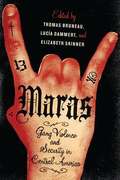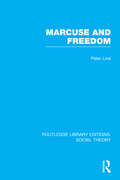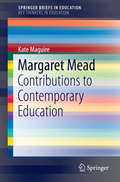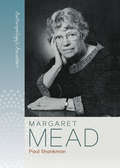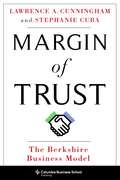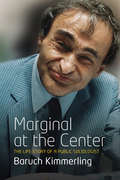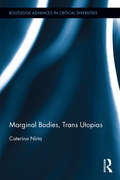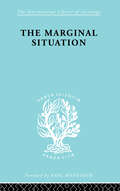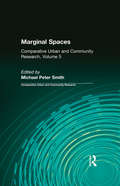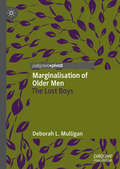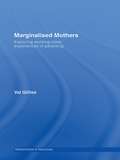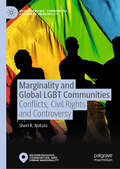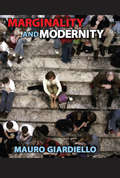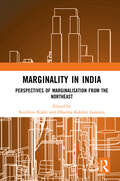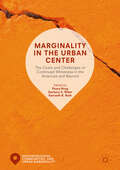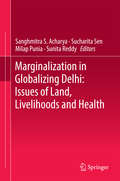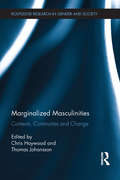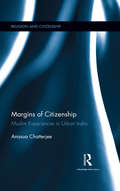- Table View
- List View
Maras
by Elizabeth Skinner Thomas Bruneau Lucéa DammertSensational headlines have publicized the drug trafficking, brutal violence, and other organized crime elements associated with Central America's mara gangs, but there have been few clear-eyed analyses of the history, hierarchies, and future of the mara phenomenon. The first book to look specifically at the Central American gang problem by drawing on the perspectives of researchers from different disciplinary backgrounds, Maras: Gang Violence and Security in Central America provides much-needed insight. These essays trace the development of the gangs, from Mara Salvatrucha to the 18th Street Gang, in Los Angeles and their spread to El Salvador, Honduras, Guatemala, and Nicaragua as the result of members' deportation to Central America; there, they account for high homicide rates and threaten the democratic stability of the region. With expertise in areas ranging from political science to law enforcement and human rights, the contributors also explore the spread of mara violence in the United States. Their findings comprise a complete documentation that spans sexualized violence, case studies of individual gangs, economic factors, varied responses to gang violence, the use of intelligence gathering, the limits of state power, and the role of policy makers. Raising crucial questions for a wide readership, these essays are sure to spark productive international dialogues.
Marching Into Darkness
by Waitman Wade BeornOn October 10, 1941, the entire Jewish population of the Belarusian village of Krucha was rounded up and shot. While Nazi death squads routinely carried out mass executions on the Eastern Front, this particular atrocity was not the work of the SS but was committed by a regular German army unit acting on its own initiative. Marching into Darkness is a bone-chilling exposé of the ordinary footsoldiers who participated in the Final Solution on a daily basis. Although scholars have exploded the myth that the Wehrmacht played no significant part in the Holocaust, a concrete picture of its involvement at the local level has been lacking. Among the crimes Waitman Wade Beorn unearths are forced labor, sexual violence, and graverobbing, though a few soldiers refused to participate and even helped Jews. By meticulously reconstructing the German army's activities in Belarus in 1941, Marching into Darkness reveals in stark detail how the army willingly fulfilled its role as an agent of murder on a massive scale. Early efforts at improvised extermination progressively became much more methodical, with some army units going so far as to organize "Jew hunts. " Beorn also demonstrates how the Wehrmacht used the pretense of anti-partisan warfare as a subterfuge by reporting murdered Jews as partisans. Through archival research into military and legal records, survivor testimonies, and eyewitness interviews, Beorn paints a searing portrait of a professional army's descent into ever more intimate participation in genocide.
Marcuse and Freedom: The Genesis And Development Of A Theory Of Human Liberation (Routledge Library Editions: Social Theory Ser.)
by Peter LindThis comprehensive study of Marcuse’s thought concentrates on his theory of freedom, arguing that it is this which supplies the key to all his writings. This argument is substantiated by a detailed chronological examination of Marcuse’s works. The author shows the rigorous logic underlying Marcuse’s thinking, which is often obscured in Marcuse’s own presentation, and pays particular attention to the influence of Heidegger, and of Marx’s notion of human labour. This sympathetic reconstruction of the subject attempts to rescue Marcuse from misunderstanding and superficial criticism, and argues that Marcuse’s most famous work, One Dimensional Man, is in fact an aberration from the mainstream of his work. This book forms one of the most accessible and reliable treatments of Marcuse available.
Mares i pares influencers: 50 eines per entendre i acompanyar adolescents d'avui
by Eva Bach Montse Jiménez«Estàs a punt de llegir un llibre que et farà feliç.» Jaume Funes Aquest llibre s'adreça a qualsevol persona que tingui adolescents a prop i que vulgui viure més agradablement aquesta etapa de la vida, tan meravellosa com desconcertant. Mitjançant 50 idees, les autores ens mostren com obrir-nos a noves maneres d'entendre la vida, les relacions, els estudis, l'amor, la sexualitat, l'amistat, la felicitat, les emocions, els valors, les prioritats, el futur i tot un seguit de temes que ens descol·loquen perquè capgiren els nostres plantejaments. Partint de la seva experiència com a mares i educadores, així com de les aportacions de professionals de diversos àmbits, i després d'escoltar a més de 1.500 joves, l'Eva Bach i la Montse Jiménez ens ajuden a actualitzar-nos i ens ofereixen orientació i recursos per arribar als cor dels adolescents i de les adolescents, i convertir-nos així en la seva millor influència.
Margaret Mead
by Kate MaguireThis book makes a case for Margaret Mead's contributions to education discourses, which in retrospect appear visionary and profoundly democratic, non judgemental and transdisciplinary, and for their relevance for education today at primary, secondary and tertiary levels. Mead combined her substantial skills and knowledge as a linguist, anthropologist and psychologist to draw attention to the primary role of culture and society in identity formation, privileging against sterner perspectives, the idea that the conditions that support the emergence of balanced personalities, able to contribute to society and to progress themselves as individuals, starts with observation of self before that of others. This observation of and reflection on self was for her a necessary demonstration of transparency while close observation of others was 'an act of love', much as the artist contemplates his/her subject, that dissolved negative differences of culture, belief and status.
Margaret Mead: A Life
by Jane HowardComprehensive biography of the pioneering cultural anthropologist.
Margaret Mead: Anatomy Of An Anthropological Controversy (Anthropology's Ancestors #1)
by Paul ShankmanTracing Mead’s career as an ethnographer, as the early voice of public anthropology, and as a public figure, this elegantly written biography links the professional and personal sides of her career. The book looks at Mead’s early career through the end of World War II, when she produced her most important anthropological works, as well as her role as a public figure in the post-war period, through the 1960s until her death in 1978. The criticisms of Mead are also discussed and analyzed. This short volume is an ideal starting point for anyone wanting to learn about, arguably, the most famous anthropologist of the twentieth century.
Margin of Trust: The Berkshire Business Model
by Lawrence Cunningham Stephanie CubaWarren Buffett and his company, Berkshire Hathaway, are legendary for their distinctive investing approach. Yet many equally unconventional but less well known aspects of Berkshire’s managerial practices and organizational structure are rich with lessons for those seeking to follow in Buffett’s footsteps. Margin of Trust is the first book to distill Buffett’s approach to management and corporate life. It provides a definitive analysis of the tenets of the Berkshire system, its costs and benefits, and how it can be adapted for other organizations.Lawrence A. Cunningham and Stephanie Cuba develop a new account of how Berkshire Hathaway works, showing that the key to its success is trust. Profiling partnership practices and business methods, they contend that Berkshire’s distinguishing feature is a culture in which autonomy and decentralization are core management principles. Cunningham and Cuba provide instructive examples of how this model has been successfully adapted by other companies that share a faith in trust as an organizing principle. They also offer candid commentary on the risks of a trust-based approach and how to mitigate them. Margin of Trust features illuminating analysis of Buffett’s take on the role trust plays in business agreements, what Buffett looks for in great corporate boards, and what lies ahead for Berkshire after its iconic leader leaves the scene.
Marginal At The Center: The Life Story of a Public Sociologist
by Baruch KimmerlingA self-proclaimed guerrilla fighter for ideas, Baruch Kimmerling was an outspoken critic, a prolific writer, and a "public" sociologist. While he lived at the center of the Israeli society in which he was involved as both a scientist and a concerned citizen, he nevertheless felt marginal because of his unconventional worldview, his empathy for the oppressed, and his exceptional sense of universal justice, which were at odds with prevailing views. In this autobiography, the author, who was born in Transylvania in 1939 with cerebral palsy, describes how he and his family escaped the Nazis and the circumstances that brought them to Israel, the development of his understanding of Israeli and Palestinian histories, of the narratives each society tells itself, and of the implacable "situation"--along with predictions of some of the most disturbing developments that are taking place right now as well as solutions he hoped were still possible. Kimmerling's deep concern for Israel's well-being, peace, and success also reveals that he was in effect a devoted Zionist, contrary to the claims of his detractors. He dreamed of a genuinely democratic Israel, a country able to embrace all of its citizens without discrimination and to adopt peace as its most important objective. It is to this dream that this posthumous translation from Hebrew has been dedicated.
Marginal Bodies, Trans Utopias (Routledge Advances in Critical Diversities)
by Caterina NirtaAlthough over the last two decades there has been a proliferation of gender studies, transgender has largely remained institutionalised as an ‘umbrella term’ that encapsulates all forms of gender understandings differing from what are thought to be gender norms. In both theoretical and medical literature, trans identity has been framed within a paradigm of awkwardness or discomfort, self-dislike or dysfunctional mental health. Marginal Bodies, Trans Utopias is a multidisciplinary book that draws primarily from Deleuze and post-structuralism in order to reformulate the concept of utopia and ground it in the materiality of the present. Through a radically new conceptualisation of the time and space of utopia, it analyses empirical findings from trans video diaries on the Internet belonging to transgender individuals. In doing so, this volume offers new insights into the everyday challenges faced by these subjectivities, with case studies focusing on: the legal/social impact of the UK’s Gender Recognition Act 2004, boundaries of public and private as evidenced within public toilets, and the narrative of the ‘wrong body’. Contextualising and applying Deleuzian concepts such as ‘difference’ and ‘marginal’ to the context of the research, Nirta helps the reader to understand trans as ‘unity’ rather than as a ‘mind-body mismatch’. Contributing to the reading and understanding of trans lived experience, this book shall be of interest to postgraduates and postdoctoral researchers interested in fields such as Transgender Studies, Critical Studies, Sociology of Gender and Philosophy of Time.
Marginal Narratives and the Question of Human Rights in Asian Pacific Literature
by Sk Sagir Ali Avijit BasakThis book represents a significant intervention in human rights and its literary praxis, underscoring its paramount relevance and pressing urgency within the intricate tapestry of the Asian Pacific context. The book examines the local trauma endured within the complex geopolitical landscape of the Asian continent while also embracing a broader outlook that transcends geosocial boundaries. As a pivotal contribution to the discourse on Asian trauma studies, the chapters address a critical scholarly lacuna by delving into critical theoretical reflections and providing a robust epistemological foundation. The chapters look at human rights and trauma studies in a way that focuses not only on Europe. The volume fosters a deep comprehension of the historical and cultural facets shaping the Asian continent and its human rights challenges. The book is indispensable for educators, policymakers, and researchers engaged in the intricate realm of human rights and trauma studies.
Marginal Situation Ils 112 (International Library of Sociology)
by H. E. Dickie-ClarkFirst published in 1998. Routledge is an imprint of Taylor & Francis, an informa company.
Marginal Spaces: Ser Volume 5
by Michael Peter SmithThe literature on modernist and postmodernist urban development is abundant, yet few researchers have taken up the challenge of studying the areas hi which marginalized people live as sources of resistance to continued modernization. In Marginal Spaces, Michael Smith has assembled case studies combining structural and historical analyses of the moves of powerful social interests to dominate social space, and the tactics and strategies various marginalized social groups employ to reclaim dominated space for their own use. The marginal spaces embodied in the title of this fifth volume of the Comparative Urban and Community Research series include five sites of domination and resistance. A squatters' movement in Ann Arbor, Michigan, resists the adverse consequences of four decades of urban development. A homeless encampment in Chicago engages hi "guerilla architecture" and other moves designed to reconstitute prevailing social constructions of the problem of "homelessness." An antigentrification movement hi the East Village of New York engages hi an ongoing struggle to resist efforts by developers to market their neighborhood as space for luxury condominium development. There is a Public Housing Council organized by African American women hi New Orleans that is resisting both the material regulation of their daily lives and the dominant social construction of public housing as a racially gendered space suitable only for "dependent" women and children of color. Finally, there is a subordinate labor market niche hi California agriculture where indigenous Mixtec peasants from Oaxaca are displacing the more traditional mestizo farm workers, but who are also politically organizing as a transnational grassroots movement, pursuing a binational strategy to alleviate then- economic, political, and cultural marginality. Contributions and contributors include: "House People, Not Cars!" by Corey Dolgon, Michael Kline, and Laura Dresser; "Tranquillity City" by Tahnadge Wright; "Private Redevelopment and the Changing Forms of Displacement hi the East Village of New York" by Christopher Mele; "Resisting Racially Gendered Space" by Alma Young and Jyaphia Christos-Rodgers; and "Mixtecs and Mestizos hi California Agriculture" by Carol Zabin. This volume will be of interest to urban planners, sociologists, and political scientists, especially those with strong interests hi local ethnography and concrete policy.
Marginalisation of Older Men: The Lost Boys
by Deborah L. MulliganMarginalisation of Older Men: The Lost Boys focuses on the phenomenon of the marginalisation of older men and the impact of gendered ageing as a pathologic disorder leading to suicide ideation, rather than a celebratory state. In this engaging investigation,Deborah Mulligan explains why and how some older men have become marginalised in society, and the effects of this social isolation. The book offers effective and unique methods for researching marginalised groups and individuals to maximise innovativeness, reciprocity and utility for research participants. Mulligan skilfully articulates and communicates the hitherto unheard voices of older males. These voices represent a vital element in the mitigation of loneliness, social isolation and suicide. The lived experience of these individual men and their peers provides vital health information for older men in both contemporary and future society.
Marginalised Mothers: Exploring Working Class Experiences of Parenting (Relationships and Resources)
by Val GilliesSuccessive moral panics have cast poor or socially excluded mothers - associated with social problems as diverse as crime, underachievement, unemployment and mental illness - as bad mothers. Their mothering practices are held up as the antithesis of good parenting and are associated with poor outcomes for children. Marginalised Mothers provides a detailed and much-needed insight into the lived experience of mothers who are frequently the focus of public concern and intervention, yet all too often have their voices and experiences overlooked. The book explores how they make sense of their lives with their children and families, position themselves within a context of inequality and vulnerability, and resist, subvert and survive material and social marginalisation. This controversial text uses qualitative data from a selection of working class mothers to highlight the opportunities and choices they face and to expose the middle class assumptions that ground much contemporary family policy. It will be of interest to students and researchers in sociology, social work and social policy, as well as social workers and policymakers.
Marginalisierung, Stadt und Soziale Arbeit: Soziale Arbeit im Spannungsfeld von Politik, Quartierbevölkerung und professionellem Selbstverständnis (Quartiersforschung)
by Carlo Fabian Patrick Oehler Sandra Janett Jutta Guhl Bruno MichonDieser Open-Access-Sammelband zeigt auf, welche Themen mit Blick auf das Handlungsfeld Soziale Arbeit und Stadtentwicklung besonders relevant sind und zurzeit im Vordergrund stehen. Marginalisierte Menschen und Quartiere sind typische Phänomene sozialer Ungleichheit in modernen Städten, auf die sich Soziale Arbeit – von Beginn an – forschend und professionell handelnd bezieht. Themen, die in den Beiträgen verhandelt werden, sind unter anderem marginalisierte Quartiere, Segregation, Nachbarschaften, Community Organizing/Gemeinwesenarbeit, Partizipation, Integration, Sozialplanung, lokale Demokratie und soziale Innovation.
Marginality and Global LGBT Communities: Conflicts, Civil Rights and Controversy (Neighborhoods, Communities, and Urban Marginality)
by Sheri R. NotaroThis book examines the interconnectedness of LGBT civil and political rights, bias, discrimination, homophobia, and LGBT health disparities both in the United States and globally. According to Notaro, the failure to extend equitable civil and political rights to LGBT individuals—combined with recent reversal of past gains—will continue to be associated with bias, stigma and discrimination toward the LGBT community. In turn, this sustained bias and stigma fosters a host of LGBT health disparities, including access to culturally competent health care, HIV/AIDS, substance use, homelessness, suicide, and violence. Thus, the bias and discrimination levied at the LGBT community is discussed as a major explanatory factor in life-threatening health disparities experienced by the community, particularly in urban areas worldwide. The volume provides a framework for considering future research that must identify ways to prevent these health disparities, being mindful of and harnessing the protective factors and supports that exist within the diverse LGBT community.
Marginality and Modernity
by Mauro GiardielloThis book traces the major stages in the evolution of the sociological concept of marginality, highlighting in particular the contribution made by Gino Germani. Its purpose is to analyse, starting with the sociological theory of the early 1960s, the progressive maturation of the scientific status of the concept of marginality, and to test the theoretical premise that gave rise to Germani's theory of marginality.The author begins by examining the contribution of the Chicago School. He explores the complex relationship between the theory of marginality and modernization by analysing North American theses and the criticisms mainly generated in Latin America. The goal is to reconstruct Germani's theoretical model of marginality, addressing its application to contemporary social and economic conditions.Giardiello's analysis is intertwined with two themes that are central to Germani's thought about marginality. The first concerns the origin of the concept of social exclusion within sociological thought. The second shows how marginality is clearly a phenomenology connected to the contradictions of modernity. Germani's paradigm of marginality enables the social scientist to resolve the contradictions between the analytical perspectives that deal with marginality in an objective way and the one that observes it subjectively.
Marginality in India: Perspectives of Marginalisation from the Northeast
by Kedilezo Kikhi and Dharma Rakshit GautamThe book takes a close look into the definitions and categorizations of marginality, inequality, agency and location in society. It examines the systems of marginalization and othering by exploring perspectives of socially excluded people and communities in Northeast India. The context of Northeast India provides unique perspectives on the debates around marginality due to the existence of multi-ethnic cultures in the region and since its prolonged colonial historical experience alienated it from the rest of India. This volume focuses on the issues pertaining to tribe, caste, gender identity, religion, and physical disability in the region. It also looks at the roles which institutions, education and the media play in the creation and perpetuation of social exclusion and the centre—periphery binary. With essays from eminent scholars and social scientists, the book discusses themes such as citizenship and borders, national and tribal identity, the role of the law, government and policies for countering exclusion and the challenges which socially excluded groups and communities face to gain agency, autonomy and the right to equality. This book will be useful for scholars and researchers of sociology, Northeast India studies, political sociology, development studies, political science, gender studies, and social anthropology.
Marginality in the Urban Center: The Costs and Challenges of Continued Whiteness in the Americas and Beyond (Neighborhoods, Communities, and Urban Marginality)
by Peary Brug Zachary S. Ritter Kenneth R. RothThis book examines the increasing marginalization of and response by people living in urban areas throughout the Western Hemisphere, and both the local and global implications of continued colonial racial hierarchies and the often-dire consequences they have for people perceived as different. However, in the aftermath of recent U.S. elections, whiteness also seems to embody strictures on religion, ethnicity, country of origin, and almost any other personal characteristic deemed suspect at the moment. For that reason, gender, race, and even class, collectively, may not be sufficient units of analysis to study the marginalizing mechanisms of the urban center. The authors interrogate the social and institutional structures that facilitate the disenfranchisement or downward trajectory of groups, and their potential or subsequent lack of access to mainstream rewards. The book also seeks to highlight examples where marginalized groups have found ways to assert their equality. No recent texts have attempted to connect the mechanisms of marginality across geographical and political boundaries within the Western Hemisphere.
Marginalization in Globalizing Delhi: Issues of Land, Livelihoods and Health
by Sanghmitra S. Acharya Sucharita Sen Milap Punia Sunita ReddyThis book analyses how developmental projects in a globalizing Delhi have brought about neglect, exclusion and alienation of certain sections of population, while benefiting others. It discusses the physical, economic and social displacement of people in the city in recent times, which has deprived them of their lands, livelihoods and access to health care. In Delhi and the National Capital Region, beyond the obvious and apparent image of wide roads, flyovers, the metro rail network, high-rises and glittering malls, globalization has brought about skewed and uneven development. A growing middle class and a significant group of an extremely rich section of population steer the ways in which development strategies are planned and implemented. Furthermore, with government control reducing as is inevitable and consistent with a neoliberal policy framework, private players have entered not only the consumer goods sector, but also basic goods and services such as agriculture, health and education. This book explores the effects of such processes, with a specific focus on equity, on the marginalized sections of population in a globalizing megacity. It addresses the themes of land, livelihoods and health as overarching, drawing upon their interlinkages. It traces the changes in the growth of the city in context of these themes and draws inferences from their interconnectedness to examine the current situation of development in Delhi.
Marginalization in Urban China
by Fulong Wu Chris WebsterThis book covers social inequalities in Chinese cities and provides comparative perspectives on inequality and social polarization, neoliberalization and the poor, the change of property rights, rural to urban migration and migrants' enclaves, deprivation and residential segregation, state social security and reemployment training programs.
Marginalized Masculinities: Contexts, Continuities and Change (Routledge Research in Gender and Society)
by Chris Haywood and Thomas JohanssonAcross Europe we are witnessing a series of events that are drawing upon representations of men and masculinity that are rupturing the social fabric of everyday life. For example, media reports of social unrest, misogynous hate crime, religious extremism, drug trafficking and political Far Right mobilization often have been at the centre of the discussion the figure of the apathetic, disenchanted, socially excluded young man. Marginalized Masculinities explores how men in precarious positions in different countries and social contexts understand and experience their masculinities, focusing on men who are viewed as being marginal in a range of fields in society including the family, work, the media and school. By focusing on atypical or marginal masculinities in each subfield, Haywood and Johansson provide an informed understanding of what it means to experience marginalization. Indeed, within this enlightening volume the chapters engage with the issue of whether it is necessary to name ‘a’ dominant masculinity in order to make sense of and understand the nature of marginalized masculinity. This insightful title will be of interest to researchers, undergraduates and postgraduates interested in fields such as Gender Studies, International Studies, Comparative Studies and Men Studies.
Margins and Mainstreams: Asians in American History and Culture
by Gary Y. OkihiroWhile exploring anew the meanings of Asian American social history, the book argues that the core values and ideals of the nation emanate today not from the so-called mainstream but from the margins, from among Asian and African Americans, Latinos and American Indians, and women. Those groups in their struggles for equality, have helped to preserve and advance the founders? ideals and have made America a more democratic place for all.
Margins of Citizenship: Muslim Experiences in Urban India (Religion and Citizenship)
by Anasua ChatterjeePart of the ‘Religion and Citizenship’ series, this book is an ethnographic study of marginality of Muslims in urban India. It explores the realities and consequences of socio-spatial segregation faced by Muslim communities and the various ways in which they negotiate it in the course of their everyday lives. By narrating lived experiences of ordinary Muslims, the author attempts to construct their identities as citizens and subjects. What emerges is a highly variegated picture of a group (otherwise viewed as monolithic) that resides in very close quarters, more as a result of compulsion than choice, despite wide differences across language, ethnicity, sect and social class. The book also looks into the potential outcomes that socio-spatial segregation spelt on communal lines hold for the future of the urban landscape in South Asia. Rich in ethnographic data and accessible in its approach, this book will be useful for scholars and researchers of sociology, social anthropology, human geography, political sociology, urban studies, and political science.
